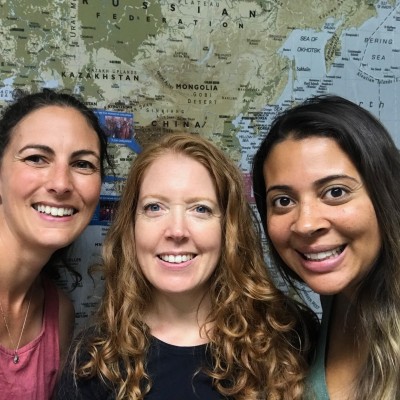He tells us how working to educate some of the youngest children fleeing his home country has begun to restore his hope after a traumatic journey to Uganda.
John fled his home country of the DRC (Democratic Republic of Congo) in 2018 where he was a teacher, after he was violently attacked and left for dead.
“One day, they came into my house and shot me. After shooting me, they put the knife that was on the end of the gun here [John points to the scarring from where he was stabbed in his neck]. I was very seriously injured. They took my savings, my computer, everything.”
Thankfully, he received lifesaving treatment just in time which saved his life, but John couldn’t talk for some time after his injuries. He and his family spent the next six months living in fear in the DRC, unable to trust anyone, as they didn’t know who was behind his attempted murder.
The NGO John worked for helped him and his family to make their escape to neighbouring Uganda. When they finally reached Bunagana on the border with Uganda in 2018, the family went to register themselves but had no official documentation. Nevertheless, John said: “They welcomed us and asked us what had happened.”
The Ugandan authorities came to the border to collect them, before taking them to Kyaka II refugee settlement, where Children on the Edge began working in 2019.
As John settled in Kyaka II, he found his passion for teaching again.
At the time, there was little education provision in the refugee camp, especially for the youngest refugee children. So he began providing education for some of the youngest refugees in his area, as he was concerned that children’s learning “was blocked”.
“I understand the situation for refugees. Lack of education is a major problem for our future. Education gives light to the future of our children.”
John soon became the director of a learning centre rebuilt by Children on the Edge, offering a bright, safe space for the youngest refugee children to receive high quality early years education and support.
When we launched our cluster learning programme, offering outdoor early years classes for small groups of young children, John mobilised his community and helped them to understand the concept.
The cluster group lessons help to reach more children in the community as the learning centre building can’t accommodate every child.
In September 2021, his village of Mukondo was the first location where we trialled the cluster lessons, and the community has been able to see the difference learning has made to their children.
John is now a ‘Trainer of Teachers’ for Children on the Edge. He used his teaching experience to help train and mentor other teachers in his community, who then lead the cluster group lessons.
“I am very, very much enjoying being a ‘Trainer of Teachers’ and feel very proud.”
His community has proven to be one of the most receptive areas, and people here really support our sustainable model of community ownership and empowerment. This is thanks to John and the fact he is a well-known and respected figure in his community.
John is also a pastor and is currently constructing a church building for his congregation. He says he will never go back to DRC, because “I like where there is peace.” John still suffers from PTSD from the attack and has flashbacks and hears shouting voices. It took several years for him to process the trauma, but he is slowly healing. He hopes his story can restore hope in others.
“My work brings me hope, because I am working with children, which I love. Children on the Edge restored my hope.”



